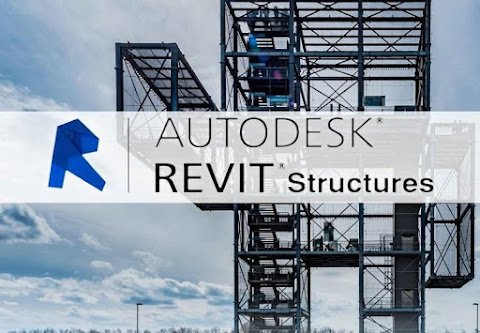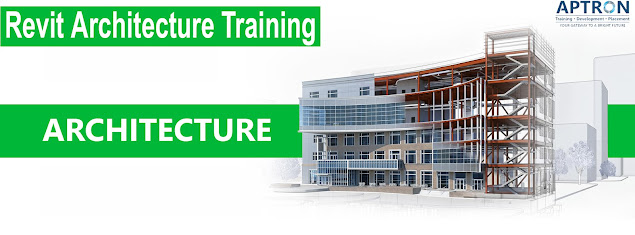Revit Structure Training Course in Noida
Are you looking to enhance your structural engineering skills and delve into the world of building design and analysis? Look no further than APTRON Solutions' top-notch Revit Structure Training Course in Noida. This comprehensive course is designed to empower aspiring engineers and architecture enthusiasts with the knowledge and proficiency needed to excel in the dynamic field of construction and design.
At APTRON Solutions, we understand the significance of staying up-to-date with the latest industry trends. Our Revit Structure Training Course is meticulously crafted to equip you with practical skills that are highly sought after in today's competitive job market. Whether you're a student aiming to jumpstart your career or a professional aiming to expand your skill set, this course caters to learners at all levels.
What is a Revit structure?
Revit Structure is a specialized software application developed by Autodesk for Building Information Modeling (BIM) in the field of structural engineering and construction. BIM is a digital representation of the physical and functional characteristics of a building or infrastructure, which serves as a collaborative tool for architects, engineers, and construction professionals to work together on a single platform throughout the entire lifecycle of a project.
Revit Structure specifically focuses on the structural aspects of a building or structure. It allows engineers and designers to create, analyze, and design building structures in a virtual environment before the actual construction begins. Here are some key features and functions of Revit Structure:
Modeling: Revit Structure enables users to create accurate 3D models of structural components such as beams, columns, slabs, walls, foundations, and more. These models can be used for visualization and analysis.
Analysis: The software provides tools for structural analysis, allowing engineers to simulate how the structure will behave under various loads and conditions. This helps in ensuring the safety and stability of the design.
Design and Documentation: Revit Structure supports the generation of detailed construction drawings, including plans, elevations, sections, and schedules. Design changes made in the model are automatically reflected in the drawings, reducing errors and inconsistencies.
Collaboration: Multiple professionals from different disciplines can collaborate on the same project model. This fosters better communication and coordination among architects, structural engineers, MEP (mechanical, electrical, plumbing) engineers, and other stakeholders.
Parametric Modeling: Revit Structure uses parametric relationships, which means that changes made to one part of the model automatically propagate to related parts. This ensures consistency and accuracy throughout the design process.
Reinforcement Detailing: Engineers can define and detail reinforcement for concrete structures directly within the software, reducing the need for manual calculations and drawings.
Integration: Revit Structure is part of the larger Autodesk Revit suite, which includes tools for architecture, MEP, and more. This integration allows for seamless collaboration and data exchange among different project disciplines.
Visualization: The 3D model can be used for visual presentations and walkthroughs, helping stakeholders understand the design intent more effectively.
Revit Structure is widely used in the construction industry to improve efficiency, accuracy, and collaboration in structural engineering projects. It has become an essential tool for professionals who design and analyze building structures, enabling them to create better designs, reduce errors, and streamline the construction process.
Revit Structure Course
The Revit Structure Course is a comprehensive training program designed to equip individuals with the skills and knowledge needed to effectively use Autodesk Revit Structure software for structural engineering and design purposes. This course caters to students, professionals, and anyone interested in enhancing their understanding of building information modeling (BIM) in the context of structural engineering. Here's an overview of what a typical Revit Structure Course might cover:
Course Overview: The course generally spans multiple modules or sections, each focusing on different aspects of Revit Structure and its applications. The curriculum is designed to progressively build skills from foundational concepts to more advanced techniques. Here's what the course might entail:
Introduction to BIM and Revit Structure:
- Understanding the principles of Building Information Modeling (BIM)
- Overview of Revit Structure interface and tools
- Setting up a new project and project templates
Basic Modeling Techniques:
- Creating and modifying basic structural elements (columns, beams, walls, slabs, etc.)
- Placing and adjusting components in 3D space
- Using reference planes and dimensions
Structural Analysis and Design:
- Applying loads and constraints for analysis
- Performing structural analysis within Revit or with external tools
- Understanding and interpreting analysis results
Reinforcement and Detailing:
- Adding reinforcement to concrete elements
- Generating reinforcement schedules
- Detailing tools for creating drawings and annotations
Collaboration and Documentation:
- Coordinating with other disciplines (architectural, MEP)
- Creating construction documentation: plans, elevations, sections
- Annotating drawings and adding dimensions
Advanced Techniques:
- Creating custom families and components
- Complex modeling techniques (curved elements, parametric families)
- Integrating advanced analysis tools and plugins
Project Work:
- Undertaking a comprehensive project using Revit Structure
- Applying learned concepts to a real-world scenario
- Problem-solving and troubleshooting in project workflows
Best Practices and Tips:
- Efficiency tips and keyboard shortcuts
- Managing large projects and collaborating effectively
- Staying updated with new features and updates
Benefits of the Revit Structure Course: Completing a Revit Structure Course can offer various benefits:
- Enhanced Skills: Gain proficiency in using Revit Structure for structural design and analysis, improving your employability and career prospects.
- Industry Relevance: Stay up-to-date with industry standards and practices in structural engineering and BIM.
- Collaboration: Learn to collaborate with architects, engineers, and other stakeholders using a shared BIM platform.
- Efficiency: Develop skills to create accurate and detailed models, reducing errors and rework in the construction process.
- Portfolio Building: Create a portfolio showcasing your Revit Structure projects, which can be valuable for job applications.
When searching for a Revit Structure Course, consider factors like the course duration, teaching methodology (hands-on training, projects), instructor expertise, and whether the course provides certification upon completion.
Why Choose APTRON Solutions for Revit Structure Training in Noida?
Expert Faculty: Our trainers are seasoned professionals with extensive experience in structural design and engineering. They bring real-world insights into the classroom, ensuring that you receive practical knowledge alongside theoretical concepts.
Hands-on Learning: We believe in learning by doing. Our training approach is hands-on, providing you with ample opportunities to work on practical exercises and real-world projects using the Revit Structure software. This approach enhances your confidence and problem-solving skills.
Comprehensive Curriculum: The course curriculum covers a wide spectrum of topics, including but not limited to structural modeling, analysis, reinforcement detailing, and collaboration techniques. This ensures that you are well-versed in the entire design workflow.
Industry-relevant Projects: Gain exposure to industry-relevant projects that simulate real-world scenarios. This allows you to apply your newly acquired skills to practical challenges, building your competence and portfolio simultaneously.
Flexible Batches: We understand the importance of flexibility in learning. APTRON Solutions offers both weekday and weekend batches, enabling you to choose a schedule that fits seamlessly into your routine.
State-of-the-art Infrastructure: Our training center is equipped with modern infrastructure and the latest software tools, creating an optimal learning environment for our students.
Placement Assistance: APTRON Solutions has a strong network of industry connections. We provide placement assistance to help you connect with potential employers and kick-start your career.
Enroll in APTRON Solutions' Revit Structure Training Course in Noida today and unlock a world of opportunities in structural engineering and design. Our goal is to empower you with the skills and knowledge needed to thrive in this evolving industry. Join us and take a step towards a successful and fulfilling career journey.
conclusion
The Revit Structure Training Course in Noida offered by various educational institutions, including APTRON Solutions, is a gateway to mastering the art of structural engineering and design through the power of Building Information Modeling (BIM). This course empowers individuals with the skills to create, analyze, and design complex building structures efficiently and accurately, transforming them into sought-after professionals in the construction and engineering industries.
By enrolling in a Revit Structure Course, participants gain access to a well-structured curriculum that covers essential topics, ranging from foundational concepts to advanced techniques. From learning the basics of BIM and navigating the Revit Structure interface to performing structural analysis, creating detailed drawings, and collaborating with other disciplines, the course provides a comprehensive education in every aspect of structural design.
One of the key advantages of this course is the hands-on approach that allows learners to put theory into practice. With the guidance of experienced instructors, participants engage in real-world projects, honing their skills by working on practical exercises and industry-relevant simulations. This dynamic learning experience not only boosts confidence but also fosters problem-solving abilities crucial for success in the field.
Moreover, a Revit Structure Course facilitates seamless collaboration among professionals from various domains, promoting effective communication and coordination throughout the design and construction process. This proficiency in collaboration contributes to the creation of well-coordinated and harmonious building projects.
As industries continue to embrace technology-driven approaches, the knowledge gained from the Revit Structure Course becomes increasingly valuable. Graduates of the program are equipped not only with a certificate of completion but also with a portfolio of projects showcasing their newfound expertise. This portfolio serves as a testament to their skills, setting them apart in a competitive job market and opening doors to exciting career opportunities in structural engineering, design, and construction.
In essence, the Revit Structure Training Course is a transformative educational journey that equips individuals with the tools they need to shape the future of construction. Through this course, students and professionals alike gain the ability to contribute to innovative and sustainable building projects, elevating the standards of the industry and leaving a lasting impact on the built environment.





Comments
Post a Comment